In Japanese, koitsu, soitsu, aitsu, doitsu こいつ, そいつ, あいつ, どいつ mean "this one," "that one (near you)," "that one (far from us)," "which one?" They're kosoado words that refer to individual items, and, sometimes, to people.
These words have nothing to do with itsu 何時, which means "when," or itsuka 何時か, "sometime."
Usage
The pronouns koitsu, soitsu, aitsu, doitsu can be used toward things or toward people. Which makes them rather problematic.
- koitsu
こいつ
This thing.
This guy, girl, dude, person. - soitsu
そいつ
That thing. (near you.)
That guy, girl, dude, person. - aitsu
あいつ
That thing. (far from us.)
That guy, girl, dude, person. - doitsu
どいつ
What thing?
What guy, girl, dude, person?
When they're used toward things, they work just like kore, sore, are, dore これ, それ, あれ, どれ. The difference being that kore can be used toward mentioned concepts, while koitsu is only used toward physical things, or, in some cases, toward something you have just witnessed.
- are wa tanoshikatta
あれは楽しかった
That thing was fun.
That thing that happened in the past was fun. - aitsu wa tanoshikatta
あいつは楽しかった
That person was fun.
That object was fun.
When they're used toward people, they work just like kochira, sochira, achira, dochira こちら, そちら, あちら, どちら. The difference being that kochira is polite, while koitsu is considered disrespectful by a lot of people, in a lot of situations.
As with everything in Japanese, when close friends do it it implies they're intimate enough to not care politeness. In every other case, it implies someone is looking down at someone else by not giving them necessary respect. In anime, it's usually the former.
- koitsu desu
コイツです
[It] is this one.
It's this guy.
It's him. - e え
Eh. - nandesuka?
何ですか?
What is it?
Note that koitsu, soitsu, aitsu, doitsu are all gender-less pronouns, but in English they often get translated as "he" or "she" depending on context.
- koitsu wa baka desu ne
こいつはバカですね
This guy is an idiot, [isn't he]?
This girl is an idiot, [isn't she]?
In particular, koitsu is often used when someone shows up out of nowhere and says something absurd. Like, "what's up with this guy?"
- koko ni sundemo ii desu ka?
ここに住んでもいいですか?
Can [I] live here? - un
うん
Hmm. - zettai dame
絶対ダメ
Absolutely not. - maji ka koitsu
マジかこいつ
Is this guy for real?
そいつ vs. あいつ
The difference between soitsu and aitsu is simply that soitsu そいつ is someone or something close to the listener (whom you're talking to), while aitsu あいつ is far from both the speaker and the listener.
- Context: Hikaru is looking for an adversary.
- aitsu to uteru?
あいつと打てる?
Can [I] [play] with [him]?- Him, over there, not near you, not near me, far from us.
- uteru - potential verb variant of:
- utsu
打つ
To hit.
To play. (a game like Go, in which you hit stones on a board.)
- gata.. ガタ・・
*chair feet hitting the floor as he gets up.* (onomatopoeia.) - a, uun, ano ko wa...
あ うーん あの子は・・・
Ah, err, [he] [is]...- ano ko
あの子
That child. That kid. (pronoun like aitsu, but used more by women.)
- ano ko
This follows the same pattern of any kosoado pronoun.
Examples
For reference, some examples illustrating how the words are used:
- koitsu ga dou natte mo ii no ka?
こいつがどうなってもいいのか?
Don't [you] care about how [he] ends up?- Phrase often used by a bad guy holding a hostage at gunpoint.
- -temo ii ~てもいい
Even so is good. In that way, too, it's good. I don't mind if it's like that. I don't care if it's like that.
- soitsu wa ningen da!
そいつは人間だ!
[He's] human! - soitsu ni nani wo shita?
そいつに何をした?
What did [you] do to [him]? - aitsu ni wa maketakunai
あいつには負けたくない
[I] don't want to lose to [him].
Sometimes, koitsu can refer to a situation that just happened, while soitsu can refer to a topic or idea that someone else brought up.
- koitsu wa odoroita!
こいつは驚いた!
About this: surprised!
This is surprising! - koitsu wa dou omou?
こいつはどう思う?
What do [you] think about this? - soitsu wa omoshiroi
そいつは面白い
That's funny. - soitsu wa dame da
そいつはダメだ
That's no good.
That idea is bad. That tool is useless. That thing is hopeless.
And, of course, it can be used toward things:
- dono juu ga hoshii?
どの銃が欲しい?
Which gun do you want? - koitsu こいつ
This one. *points to a gun.*
こいつもどいつも
The phrase koitsu mo doitsu mo こいつもどいつも, or doitsu mo koitsu mo どいつもこいつも, means literally "this one and everyone" or "everyone and this one." It's an expression used when various people keep giving you trouble.
This guy gives me trouble, that guy gives me trouble, everybody gives me trouble! Why can't they just not give me trouble for once! koitsu mo doitsu mo!
こいつら, そいつら, あいつら, どいつら
The words koitsu, soitsura, aitsura, doitsura are the plural variants of koitsu, soitsu, aitsu, doitsu. They all have the pluralizing suffix ~ra ~ら.
- koitsura
こいつら
These ones.
These guys. - soitsura
そいつら
Those ones. (near you.)
Those guys. (near you.) - aitsura
あいつら
Those ones. (far from us.)
Those guys. (far from us.) - doitsura
どいつら
What ones?
What guys?
Origin
The origin of koitsu, soitsu, aitsu, doitsu is the word yatsu 奴.
Indeed, yatsu can refer to a thing or a person, just like koitsu, soitsu, aitsu, doitsu. For example:
- kotsu wa ii yatsu da
こいつはいいやつだ
This guy is a good guy.
This one is a good one.
This thing is a good thing.
Basically, koitsu, soitsu, aitsu, doitsu is what you get by putting kono, sono, ano, dono この, その, あの, どの before yatsu.
- koitsu, or kono yatsu
こいつ, or このやつ
This one. - soitsu, or sono yatsu
そいつ, or そのやつ
That one. (near you.) - aitsu, or ano yatsu
あいつ, or あのやつ
That one. (far from us.) - doitsu, or dono yatsu
どいつ, or どのやつ
What one?
こやつ, そやつ, あやつ, どやつ
The words koyatsu, soyatsu, ayatsu, doyatsu are the ones that existed before, and then morphed into, koitsu, soitsu, aitsu, doitsu. They mean the same thing. The only difference is that the former are archaic pronouns, while the latter are the modern variants.
- koyatsu
こやつ
This one. - soyatsu
そやつ
That one. (near you.) - ayatsu
あやつ
That one. (far from us.) - doyatsu
どやつ
What one?
The plural variants:
- koyatsura
こやつら - soyatsura
そやつら - ayatsura
あやつら - doyatsura
どやつら
Since they're archaic, you won't see them in normal Japanese, but you may see them in period stories, manga, anime, etc.
- Context: Oda Nobunaga questions someone's preferential treatment.
- soyatsura wa
ii no ka
no~~
そやつらはいいのかのーーー
Those guys are alright, huh...- For those guys it's okay, but for the other guys it wasn't okay, for some reason.
Kanji
Although koitsu, soitsu, aitsu, doitsu are normally written with hiragana, they do have kanji, so, in some rare cases, you may find them actually written with kanji:
| koitsu | 此奴 |
|---|---|
| soitsu | 其奴 |
| aitsu | 彼奴 |
| doitsu | 何奴 |
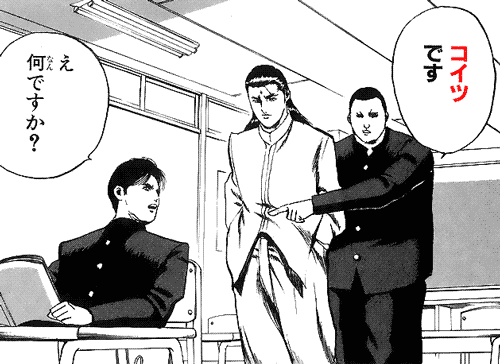
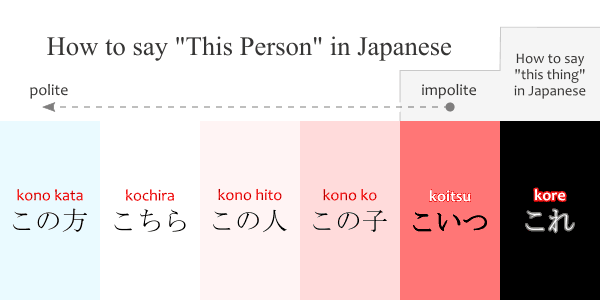
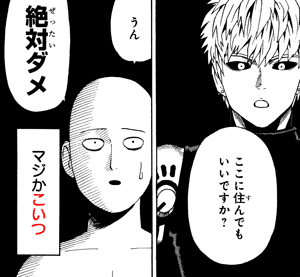
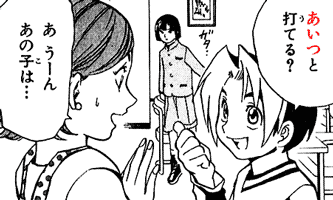
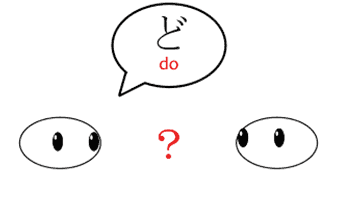
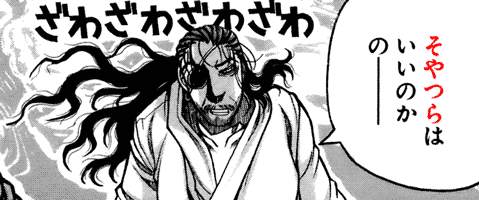
No comments: